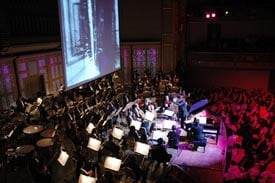Disklavier Gets "Hyper" as MIT Professor Writes Unique Piece for Boston Pops

Pianist Michael Chertock, conductor Keith Lockhart and the Boston Pops bring Tod Machover's concerto "Jeux Deux" to life during its June premiere at Boston's Symphony Hall.
|
Machover has created similar systems for Yo-Yo Ma and Prince. “The Yamaha Disklavier takes care of the first and third part of this process – collecting the data from the pianist’s performance, and playing ‘extra’ notes depending on the desired result.”
The Boston Globe found that “technology’s contribution to sound was well-served” by the performance. “The piece moved from dark to calming, before the orchestra added some surprisingly effective dissonance in what was a beguiling emotional rollercoaster,” reviewer Steve Morse concluded.
To manage the software during the performance, a small keyboard was placed atop the Disklavier for Chertock’s use, and technician Marc Downie manned a nearby computer to improvise projected visual images that complemented the music.
Machover says, “Since we knew we would have little rehearsal with the orchestra, I wanted to create a system that could be run entirely by the pianist from the Disklavier itself.”
The Pops specifically commissioned Machover to create the piece. As the head of the MIT Media Lab’s “Hyperinstruments/Opera of the Future” group, Machover is a prolific writer whom the Los Angeles Times has called “America’s most wired composer.” His works have been performed by the Los Angeles Philharmonic, the San Francisco Symphony, the Ensemble InterContemporain in Paris, the Ensemble Modern in Frankfurt, the Tokyo String Quartet and other major groups.
Yamaha not only provided the piano for Machover’s Pops premiere, but offered technical assistance as he developed the “HyperPiano” system.
“The creative compositional process is now a more extended concept than what it has been traditionally,” says Yamaha piano consultant George Litterst, who worked with Machover. “The composer is not only writing notes, but writing algorithms for the computer that determine how it follows, responds, and becomes one with the soloists.”
“I’ve never worked with an orchestra that learned a piece of mine so quickly, or played it as idiomatically, as the Pops did,” Machover says. “It was a real delight, and the audience seemed to enjoy it.”
For more information, write Yamaha Corporation of America, Piano Division, P.O. Box 6600, Buena Park, CA 90622, telephone (714) 522-9011, or e-mail infostation@yamaha.com.
 |
| © 2010 Yamaha Corporation of America. All rights reserved. |
